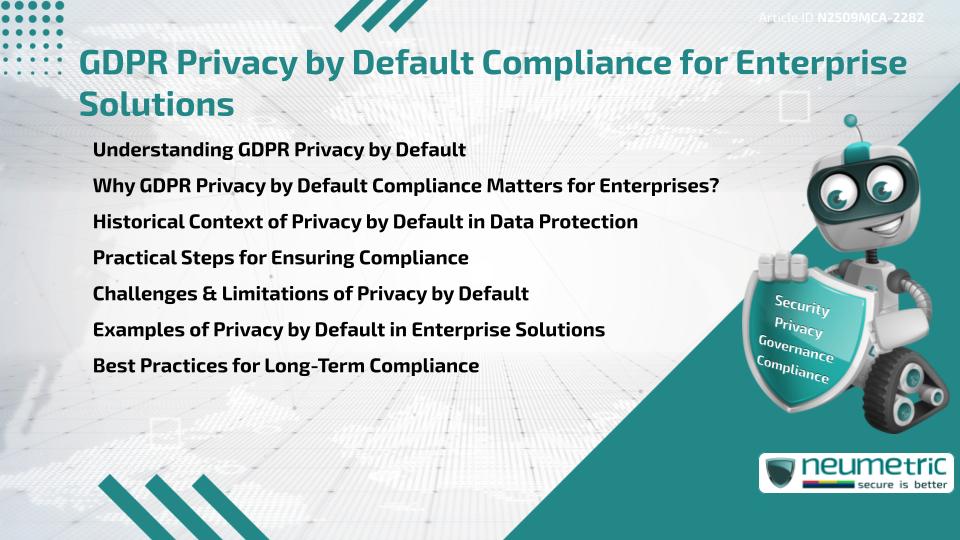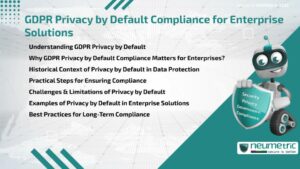Table of Contents
ToggleIntroduction
The General Data Protection Regulation [GDPR] introduced the principle of “Privacy by Default” as a fundamental requirement for Organisations. This principle ensures that enterprises configure systems, processes & applications to protect Personal Data automatically, without requiring users to change settings. GDPR Privacy by default Compliance is vital for enterprise solutions handling large-scale data, as it reduces Risks, builds Trust & aligns operations with Legal obligations. This article explores the concept, historical roots, challenges & Best Practices for embedding Privacy by default in enterprise environments.
Understanding GDPR Privacy by Default
Privacy by default means that only data necessary for a specific purpose is collected & processed. By design, enterprise systems must minimise data, restrict access & avoid unnecessary sharing. For example, an online platform should set the most Privacy-friendly options as the default, allowing users to expand sharing only if they choose. This shifts the burden away from individuals & onto enterprises, ensuring stronger Accountability.
The principle works hand in hand with “Privacy by design”, requiring Organisations to build Data Protection into products & services from the outset.
Why GDPR Privacy by Default Compliance Matters for Enterprises?
Compliance is crucial because enterprise systems often process vast amounts of Personal Data across borders. Without default protections, Organisations Risk non-compliance penalties of up to four percent (4%) of global turnover, as well as damage to brand reputation. More importantly, Privacy by default builds Customer confidence by demonstrating commitment to respecting individuals’ rights. In a competitive environment, enterprises that proactively safeguard Privacy may gain a distinct advantage.
Historical Context of Privacy by Default in Data Protection
The concept of Privacy by default predates GDPR. Earlier regulations, such as the EU Data Protection Directive of 1995, encouraged minimising data collection, but enforcement mechanisms were weak. GDPR, implemented in 2018, elevated Privacy by default into a binding obligation. This reflected growing concerns about mass surveillance, data misuse & high-profile breaches. By embedding it into law, the EU aimed to shift industry practices toward stronger, systemic safeguards.
Practical Steps for Ensuring Compliance
Achieving GDPR Privacy by default Compliance requires enterprises to implement structured measures:
- Data minimisation: Collect only the minimum data needed for each service.
- Restricted access: Limit User roles & permissions to what is necessary.
- Default security settings: Configure systems to block tracking, sharing or storage unless explicitly required.
- Consent management tools: Ensure users actively opt in to data processing beyond the essential.
- Regular Audits: Review enterprise solutions to confirm that defaults remain aligned with Privacy standards.
Challenges & Limitations of Privacy by Default
Despite its advantages, Privacy by default presents challenges. Enterprises may find it difficult to balance User experience with strict data limits. For instance, overly restrictive settings could hinder personalisation or advanced functionality. In addition, legacy systems often lack flexibility, making Compliance costly & time-consuming. There is also the ongoing challenge of maintaining Compliance as technology evolves & Business Operations expand globally.
Examples of Privacy by Default in Enterprise Solutions
Some practical examples include:
- Cloud platforms setting minimum retention periods by default.
- Enterprise collaboration tools restricting file sharing to internal users unless manually changed.
- Customer management systems masking sensitive fields by default, only revealing data when necessary.
These measures show how enterprises can operationalise Compliance without relying solely on policy statements.
Best Practices for Long-Term Compliance
To embed Privacy by default sustainably, enterprises should:
- Incorporate Privacy considerations into procurement & development processes.
- Train Employees to understand & apply Privacy defaults in daily operations.
- Use automated Monitoring Tools to detect & prevent non-compliant configurations.
- Engage with legal & technical experts to ensure alignment with evolving interpretations of GDPR.
These practices turn Compliance into an ongoing culture rather than a one-time exercise.
Takeaways
- Privacy by default ensures systems protect data automatically without User intervention.
- Compliance reduces regulatory Risk & strengthens Customer Trust.
- Enterprises must apply principles like data minimisation, restricted access & default security.
- Challenges include balancing usability with strict defaults & updating legacy systems.
- Continuous Monitoring & training are essential for long-term success.
FAQ
What does Privacy by default mean under GDPR?
It means systems & services must automatically protect Personal Data by using the most Privacy-friendly settings as the default.
Why is GDPR Privacy by default Compliance important for enterprises?
It ensures legal Compliance, minimises Risks & enhances Customer Trust in enterprise solutions.
How does Privacy by default differ from Privacy by design?
Privacy by design focuses on embedding Data Protection into the creation of systems, while Privacy by default ensures that protective settings are active automatically.
Can enterprises use consent to bypass Privacy by default?
No, consent cannot override the requirement that default settings must be Privacy-friendly. Consent only applies to additional, optional data uses.
What challenges do enterprises face in implementing Privacy by default?
Challenges include updating legacy systems, balancing User experience & managing costs of Compliance.
Are audits required for Compliance?
Yes, regular Audits help confirm that enterprise systems continue to meet Privacy by default obligations.
Do small enterprises also need to comply?
Yes, Privacy by default applies to all Organisations, regardless of size, if they process Personal Data under GDPR.
Need help for Security, Privacy, Governance & VAPT?
Neumetric provides organisations the necessary help to achieve their Cybersecurity, Compliance, Governance, Privacy, Certifications & Pentesting needs.
Organisations & Businesses, specifically those which provide SaaS & AI Solutions in the Fintech, BFSI & other regulated sectors, usually need a Cybersecurity Partner for meeting & maintaining the ongoing Security & Privacy needs & requirements of their Enterprise Clients & Privacy conscious Customers.
SOC 2, ISO 27001, ISO 42001, NIST, HIPAA, HECVAT, EU GDPR are some of the Frameworks that are served by Fusion – a SaaS, multimodular, multitenant, centralised, automated, Cybersecurity & Compliance Management system.
Neumetric also provides Expert Services for technical security which covers VAPT for Web Applications, APIs, iOS & Android Mobile Apps, Security Testing for AWS & other Cloud Environments & Cloud Infrastructure & other similar scopes.
Reach out to us by Email or filling out the Contact Form…





